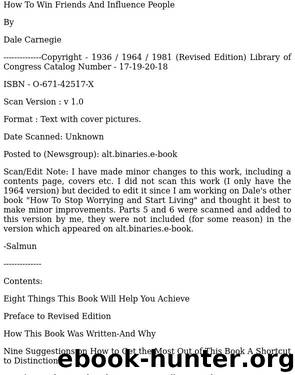How to Win Friends And Influence People by Dale Carnegie

Author:Dale Carnegie
Format: epub
We sometimes find ourselves changing our minds without any resistance or heavy emotion, but if we are told we are wrong, we resent the imputation and harden our hearts. We are incredibly heedless in the formation of our beliefs, but find ourselves filled with an illicit passion for them when anyone proposes to rob us of their companionship. It is obviously not the ideas themselves that are dear to us, but our self-esteem which is threatened. ... The little word
"my" is the most important one in human affairs, and properly to reckon with it is the beginning of wisdom. It has the same force whether it is "my" dinner, "my" dog, and "my" house, or "my" father,
"my" country, and "my" God. We not only resent the imputation that our watch is wrong, or our car shabby, but that our conception of the canals of Mars, of the pronunciation of "Epictetus," of the medicinal value of salicin, or of the date of Sargon I is subject to revision. We like to continue to believe what we have been accustomed to accept as true, and the resentment aroused when doubt is cast upon any of our assumptions leads us to seek every manner of excuse for clinging to it. The result is that most of our socalled reasoning consists in finding arguments for going on believing as we already do.
Carl Rogers, the eminent psychologist, wrote in his book On Becoming a Person:
I have found it of enormous value when I can permit myself to understand the other person. The way in which I have worded this statement may seem strange to you, Is it necessary to permit oneself to understand another? I think it is. Our first reaction to most of the statements (which we hear from other people) is an evaluation or judgment, rather than an understanding of it. When someone expresses some feeling, attitude or belief, our tendency is almost immediately to feel "that's right," or "that's stupid," "that's abnormal," "that's unreasonable," "that's incorrect," "that's not nice." Very rarely do we permit ourselves to understand precisely what the meaning of the statement is to the other person. (*)
----
[*] Adapted from Carl R. Rogers, On Becoming a Person (Boston: Houghton Mifflin, 1961), pp. 18ff.
----
I once employed an interior decorator to make some draperies for my home. When the bill arrived, I was dismayed.
A few days later, a friend dropped in and looked at the draperies. The price was mentioned, and she exclaimed with a note of triumph:
"What? That's awful. I am afraid he put one over on you."
Download
This site does not store any files on its server. We only index and link to content provided by other sites. Please contact the content providers to delete copyright contents if any and email us, we'll remove relevant links or contents immediately.
The Compound Effect by Darren Hardy(8966)
Tools of Titans by Timothy Ferriss(8394)
How to Be a Bawse: A Guide to Conquering Life by Lilly Singh(7486)
Deep Work by Cal Newport(7083)
Wiseguy by Nicholas Pileggi(5784)
Grit by Angela Duckworth(5614)
The Slight Edge by Jeff Olson(5417)
Discipline Equals Freedom by Jocko Willink(5389)
The Motivation Myth by Jeff Haden(5212)
The Laws of Human Nature by Robert Greene(5208)
Influence: The Psychology of Persuasion by Robert B. Cialdini(4796)
Year of Yes by Shonda Rhimes(4757)
The Miracle Morning by Hal Elrod(4727)
The Four Tendencies by Gretchen Rubin(4601)
Eat That Frog! by Brian Tracy(4540)
The Confidence Code by Katty Kay(4260)
Hyperfocus by Chris Bailey(4118)
Visual Intelligence by Amy E. Herman(3782)
The Inner Game of Tennis by W. Timothy Gallwey(3687)
